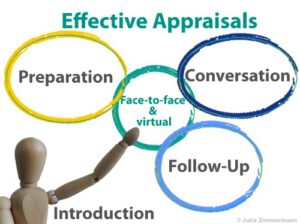How I made annual appraisals a positive and even enjoyable experience
On a regular basis I meet people who think that the appraisal process in the organisation is a waste of time and a 10 minute conversation would be enough for the annual appraisal. I even experienced it myself when I had a boss who thought that no more than five minutes should be necessary for an appraisal conversation.
Research into intrinsic motivation shows very clearly the value of constructive feedback and appraisal conversations. Brené Brown is sharing parts of her new book (Dare to lead) in LinkedIn and describes the key issue in organisation as: Avoiding tough conversations, including giving honest, productive feedback.
On the receiving end most people consider feedback, even if critical but constructive, and appraisals as a form of acknowledgement. They see it as a point to reflect on strengths and weaknesses. In addition they perceive it as a moment to explore opportunities for their own development with their boss. Hence, the annual appraisal if done well can have a great positive impact on the intrinsic motivation of your direct reports.
How to make appraisals valuable?
So let’s focus on this question. There is a lot to cover in order to make it valuable; hence, I have split this blog in four parts:
Part I: I will very briefly describe a possible structure and effective process.
Part II: I am going to focus on the preparation phase which I consider vital for an effective feedback conversation.
Part III: This contains some tips on the most effective way to conduct an appraisal conversation either in the face-to-face or virtual setting.
Part IV: The final part will focus on the follow-up and a continuous process.
I will end with some key tips and hints to make the whole appraisal process a straightforward and motivating experience.
General overview of an effective process
An effective appraisal process can be split into three phases.
 The first one is the preparation phase in which you collect feedback in a structured way and compile this in such a way that you can use it for focused discussion.
The first one is the preparation phase in which you collect feedback in a structured way and compile this in such a way that you can use it for focused discussion.
The second one is the conversation itself. This part in itself has two distinct phases following each other. You start it with a review of the year and feedback about what went well and what didn’t. Subsequently you go into forward-looking mode in which objectives might be set and development plans are discussed.
The third and final phase is the follow-up and continuous feedback loop.
Next to having the right process it is very important that you consider a feedback conversation as an open dialogue. It should be about positive aspects and areas of development accepting that views may deviate. Deviations may need to be reconciled to some extent in order to move forward.
I always consider a feedback process a two sided process where you and your direct reports have responsibilities. Both sides involved should feel responsible for fact-based evidence about what had happened throughout the year. Have a briefing conversation with your direct reports so that they recognize their responsibilities and know your expectations of their contributions to the process.
From my experience a good documentation of the fact-based evidence is very important and can make the whole conversation run very smoothly. Hence, I strongly recommend that you keep making notes of your feedback conversation with your direct reports throughout the year. Ensure that you always have specific examples and facts to support what you want to say. If you do this well it makes the appraisal conversation a simple summary of all conversations over the last 12 months.
Summary: Key tips in general
1) Keep a good documentation of your feedback conversations throughout the year.
2) Do a thorough preparation of your appraisal conversation.
3) Consider the appraisal a two sided process with shared responsibilities between you and your direct reports.
4) Make the appraisal and open dialogue which focuses in its first part on review and feedback and in its second on forward-looking and planning.
5) Before you kick-off make sure that you communicate your process and expectations to your direct reports so that he/she knows what to expect during the appraisal process.
Next week I will publish part II.
It will focus on more detailed aspects on the preparation phase. You will get some specific tips on preparation elements that, in my experience, contribute greatly to an effective appraisal. Please look out for it.
So, if you’re interested in a more in-depth conversation about your particular challenge, please .
Or feel free to share your thoughts in the comments section below.
Thank you very much for your interest.



